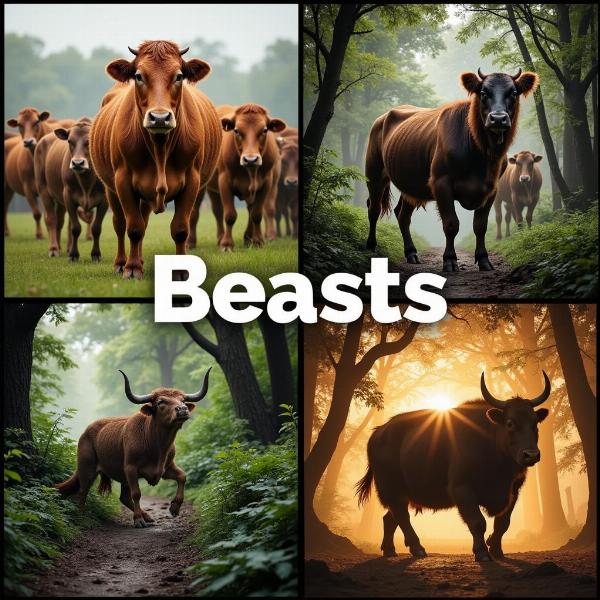Understanding the meaning of “beasts” in Hindi can be nuanced, depending on the context and the specific type of animal being referred to. While a simple translation might suffice in some cases, exploring the cultural and linguistic nuances adds depth to your understanding. This article delves into the various Hindi words used for “beasts,” their connotations, and their usage in different situations.
Exploring the Hindi Translations of “Beasts”
The Hindi language offers a rich vocabulary for describing animals, with specific terms for different species and categories. When translating “beasts,” several options exist, each carrying slightly different connotations:
- जानवर (jaanvar): This is the most common and general term for “animal” in Hindi. It encompasses a broad range of creatures, from domestic pets to wild animals. When referring to “beasts” in a general sense, jaanvar is often the most appropriate translation.
- पशु (pashu): This term specifically refers to domesticated animals, particularly livestock. While it can sometimes be used interchangeably with jaanvar, its primary meaning is tied to animals raised for agricultural purposes.
- हिंसक जानवर (hinsak jaanvar): This phrase translates to “violent animal” or “predatory animal” and is used specifically for beasts of prey. It carries a connotation of danger and aggression.
- जंगली जानवर (jangli jaanvar): Meaning “wild animal,” this term is broader than hinsak jaanvar and includes any animal that lives in the wild, regardless of its predatory nature.
Contextual Usage of “Beasts” in Hindi
The choice of Hindi word for “beasts” depends heavily on the context. For example, if you’re talking about the “beasts of the field” in a religious context, jaanvar would likely be the most appropriate choice. However, if you’re describing a dangerous predator, hinsak jaanvar would be more fitting.
Consider these examples:
- “The beasts of the jungle”: जंगल के जानवर (jangal ke jaanvar)
- “A beast of burden”: बोझा ढोने वाला पशु (bozha dhone wala pashu)
- “The beast within”: अंदर का राक्षस (andar ka rakshas) – Note that in this metaphorical context, the word राक्षस (rakshas), meaning “demon” or “monster,” might be more appropriate.
 Contextual Usage of Beasts in Hindi
Contextual Usage of Beasts in Hindi
Beasts in Indian Mythology and Culture
Animals hold significant symbolic meaning in Indian culture and mythology. Many deities are associated with specific animal companions or vehicles (vahanas). For instance, Lord Shiva’s vahana is Nandi, the bull, while Goddess Durga rides a lion. These associations reflect the reverence for animals within Hindu tradition. Learn more about mythical creatures in mythical creatures meaning in hindi. You might also be interested in knowing the donkey hindi name.
Expert Insight
Dr. Anjali Sharma, a renowned linguist specializing in Hindi and Sanskrit, explains, “The use of specific animal terms in Hindi reflects a deep connection with the natural world. The nuanced vocabulary allows for a more precise and evocative description of the animal kingdom.”
What is the Meaning of Wild Beast in Hindi?
Specifically, “wild beast” translates to जंगली जानवर (jangli jaanvar) in Hindi. This term emphasizes the untamed and often dangerous nature of the animal. Find out more about the meaning of beast in hindi and wild beast meaning in hindi on our dedicated pages. You can also discover the ship of desert meaning in hindi, which relates to another fascinating animal.
Conclusion
Understanding the different Hindi words for “beasts” allows for more accurate and culturally sensitive communication. Whether you’re discussing wildlife, livestock, or metaphorical beasts, choosing the right term adds depth and nuance to your expression. By exploring these linguistic variations, you gain a deeper appreciation for the richness of the Hindi language and its connection to Indian culture.
FAQs
-
What is the most common Hindi word for “beast”? The most common word is जानवर (jaanvar).
-
What is the Hindi word for “wild beast”? The word for “wild beast” is जंगली जानवर (jangli jaanvar).
-
What is the difference between जानवर and पशु? जानवर is a general term for animal, while पशु refers specifically to domesticated animals, particularly livestock.
-
How do I choose the right Hindi word for “beast”? The appropriate word depends on the context. Consider whether you’re referring to a wild animal, a domesticated animal, or a metaphorical “beast.”
-
Are there other Hindi words for dangerous animals? Yes, हिंसक जानवर (hinsak jaanvar) specifically refers to predatory or violent animals.
-
What is the significance of animals in Indian culture? Animals hold significant symbolic meaning in Indian mythology and culture, often representing deities or embodying specific virtues.
-
Where can I learn more about Hindi translations? Meaning-Hindi.in provides extensive resources on Hindi language and translation.
About Meaning-Hindi.in
Meaning-Hindi.in is your one-stop solution for all your Hindi translation needs. We offer a wide range of professional translation services, specializing in business, legal, technical, website localization, educational, and specialized translations, including quick and urgent requests. Whether you need to translate business documents or legal contracts, our team of expert translators ensures accuracy and cultural sensitivity. Contact us today at [email protected] or +91 11-4502-7584 to discuss your translation needs and experience the Meaning-Hindi.in difference.